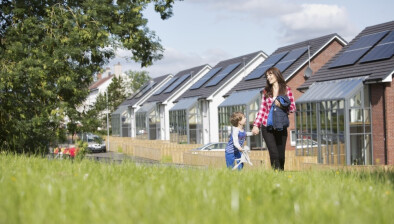Carbon emissions in Scotland drop by 10% in 2020, Lloyds finds

Philip Grant
Analysis by Bank of Scotland owner Lloyds Banking Group and the Carbon Trust has found that carbon emissions in Scotland are down 10% compared to the same time last year.
However, also found that emissions rose 26% in Scotland between the second and third quarter of the year as spending increased on commuting and travel.
The analysis considered the impact on carbon emissions resulting from changing consumer behaviour across six spending categories: retail food and drink, fuel, commuting, airlines, electrical stores and clothing stores. The findings show again the close connection between how UK consumers choose to spend their money and the resulting impact on the environment, reflecting the broader way the pandemic is changing the way people live their lives.
Fuel spend was a key factor behind the increase in carbon emissions as people began travelling again. Between Q2 and Q3, carbon emissions from fuel spend rose 70%, the equivalent of more than 181,000 tonnes. Furthermore, an increase in the amount spent on commuting resulted in carbon emissions increasing by 266%, over 40,000 tonnes of CO2.
As some international borders reopened, carbon emissions from airlines also increased as Britons headed abroad for the summer. Emissions rose 77% from Q2 to Q3, the equivalent of an increase of just under 19,000 tonnes of CO2. Despite this increase, emissions from airlines are still down 62% on 2019 levels.
Emissions rose after national lockdown restrictions were released – but as we head through the last quarter of the year, we can expect further change in carbon emissions as different regional and national restrictions have a further impact in lowering emissions.
With one year to go until COP26, a global summit about climate change and what nations are planning to do to tackle it, found that in the last four months there has been a 6 percentage point decrease in consumers wanting to reduce their carbon footprint over the next year (now at 36%, down from 42%).
While there has been an increase in airline emissions this quarter, a third (31%) of people in Scotland said they want to limit their air travel in the year ahead however, this is down from 32% in June. When considering future transport choices, one in ten (10%) are looking to make the switch to a hybrid or electric car in 2021, and 8% are looking to buy any other electrified mode of transport such as an electric scooter.
There is appetite amongst Scottish consumers for them to make smaller, everyday changes in their lives to reduce their carbon footprint. Of those interviewed, almost three-quarters (71%) plan to recycle as much as possible, while six in ten (59%) plan to cut spending on single use plastic products in the next year.
Philip Grant, chair of Lloyds Banking Group’s Scottish executive committee, said: “With just over a year to go until COP26 reaches Glasgow it’s more important than ever that climate change and sustainability are at the forefront of consumer’s minds. It’s encouraging to see consumer attitudes changing in spite of, or potentially due to, the coronavirus pandemic.
“We want to play our role in helping ensure the UK’s recovery is a green one which is why we’re committed to working with our partners, communities, businesses and customers to help rebuild both the economy and the environment.
“This means that the old approaches to doing things will no longer work. We need to work collectively in new, fresh ways to build back better and positively influence change.”







